 The Nokia 6680 imaging smartphone has been declared the new ‘Best in Class’ 3G device according to a report by Strategy Analytics.
The Nokia 6680 imaging smartphone has been declared the new ‘Best in Class’ 3G device according to a report by Strategy Analytics.
Four of the best 3G devices currently available in Western European were put under the microscope by Strategy Analytics’ Advanced Wireless Laboratory (AWL) panels in London, UK and Milan, Italy.
All of the phones were assessed on four categories: Video Features, User Interface & Input, Display, and Style/Design, with the Nokia reigning supreme in two categories, Display and Style/Design, as well as registering a joint highest score for User Interface.
When the white-coated, clipboard-toting boffins had finished tallying up the scores, the Nokia 6680 was also the only device to score above the mean score across all four categories.
The 6680 achieved a composite mean rating of 73, compared with 71 for the Sony Ericsson V800, 69 for the Motorola E1000 and 64 for the NEC e338.
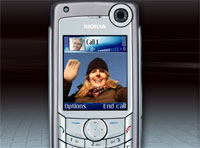 The report noted strong deviations (oo-er!) in the results of these evaluations by gender with the lay-deees preferring the Sony Ericsson and NEC devices, whereas the geezers exhibited a strong preference for the Nokia and Motorola handsets.
The report noted strong deviations (oo-er!) in the results of these evaluations by gender with the lay-deees preferring the Sony Ericsson and NEC devices, whereas the geezers exhibited a strong preference for the Nokia and Motorola handsets.
“This acknowledgment underscores Nokia’s leadership in 3G devices,” purred Joe Coles, Director of imaging product marketing at Nokia. “The Nokia 6680 is an example of an engineering masterpiece that offers very sophisticated technology combined with ease of use and extremely desirable design. Devices like it pave the way for transforming the way people live, work, play and communicate.”
The Nokia scored particularly well in the Style/Design category, with 98% of participants nominating the phone as the ‘coolest’.
Users were also mightily impressed with the clarity, resolution and brightness of the Nokia 6680 smartphone’s display.
The phone’s User Interface and menu system was considered “logical and easy to use” by the majority of users, with the smartphone scoring highest in the exciting sounding categories of ‘Configuration and Usability of Hot-Buttons’ and ‘Ease of switching between text options’ (who dreams these things up?).
Kevin Nolan, Director of Strategy Analytics’ Advanced Wireless Laboratory commented: “As handset manufacturers compete to launch compelling devices that will meet the demands of the advanced buyers who will drive multimedia content consumption across 3G networks, the Nokia 6680 has set a new standard for performance in terms of usability and device size and style.”
 As we announced in March, the Nokia 6680 imaging smartphone comes with a shedload of features including two integrated cameras, a flash, the Nokia XpressPrint printing solution, an active slide for easy camera activation and a bright screen of up to 262,144 colours.
As we announced in March, the Nokia 6680 imaging smartphone comes with a shedload of features including two integrated cameras, a flash, the Nokia XpressPrint printing solution, an active slide for easy camera activation and a bright screen of up to 262,144 colours.
All the vogue Smartphone features are present and correct, with the Nokia sporting an organiser, video streaming, Internet browser, email and 3G-enabled services, such as two-way video calling and video sharing.
As competing handset manufacturers try to catch the eye of consumers by ramping up the gizmos and widgets, it’s important that the phones remain easy to use.
Nokia have acquired a well earned reputation for the simplicity of their interfaces and this writer still rues the day he moved from his Nokia phone to a fiddly-tastic Sony Ericsson.
 Microsoft has released the final version of MSN Desktop Search, offering new features based on extensive user feedback and boasting extended support for file types.
Microsoft has released the final version of MSN Desktop Search, offering new features based on extensive user feedback and boasting extended support for file types.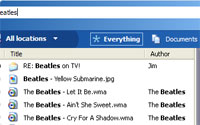 These advanced indexing options also let users specify file types to be indexed as text, create a list of file types that should not be indexed, decide the location of the index file and boost the priority of the indexing process (although this may cause some PCs to run as slow as a tired sloth on Mogadons, but at least it can be turned off).
These advanced indexing options also let users specify file types to be indexed as text, create a list of file types that should not be indexed, decide the location of the index file and boost the priority of the indexing process (although this may cause some PCs to run as slow as a tired sloth on Mogadons, but at least it can be turned off). As is the norm with search toolbars, there’s a pop up blocker and form-filler installed, although there’s still no Firefox-style tabbed browsing on offer, although MSN says it will be added soon.
As is the norm with search toolbars, there’s a pop up blocker and form-filler installed, although there’s still no Firefox-style tabbed browsing on offer, although MSN says it will be added soon.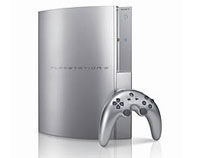 Sony has unveiled prototypes of their new Playstation 3 console at the Electronic Entertainment Expo (E3) in Los Angeles.
Sony has unveiled prototypes of their new Playstation 3 console at the Electronic Entertainment Expo (E3) in Los Angeles.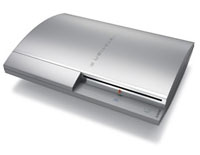 Sony are currently collaborating with the world’s leading tools and middleware companies, to provide developers with extensive tools and libraries to make the best of the Cell processor and enable efficient software development.
Sony are currently collaborating with the world’s leading tools and middleware companies, to provide developers with extensive tools and libraries to make the best of the Cell processor and enable efficient software development. More and more people are using computers or portable players for music, even though traditional radio still leads the competition, according to a recent market study.
More and more people are using computers or portable players for music, even though traditional radio still leads the competition, according to a recent market study. Last week, Yahoo revealed their determination to become big noise in the music industry, unveiling a
Last week, Yahoo revealed their determination to become big noise in the music industry, unveiling a 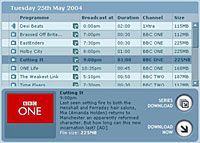 BBC New Media is to extend trials of its interactive Media Player (iMP), allowing viewers to download material from 500 hours of its television and radio programming.
BBC New Media is to extend trials of its interactive Media Player (iMP), allowing viewers to download material from 500 hours of its television and radio programming. The 5,000 trialists will be able to search for programmes they want to watch, filter programmes by channel, select subtitles and, in the case of some series, to collect and watch episodes that they may otherwise have missed.
The 5,000 trialists will be able to search for programmes they want to watch, filter programmes by channel, select subtitles and, in the case of some series, to collect and watch episodes that they may otherwise have missed.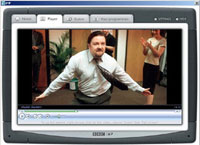 The pilot will use DRM software to delete programmes seven days after the programme has aired on TV, ensuring that users can no longer watch the content after that time. The digital rights system will also prevent users emailing the files to their chums or sharing it via disc.
The pilot will use DRM software to delete programmes seven days after the programme has aired on TV, ensuring that users can no longer watch the content after that time. The digital rights system will also prevent users emailing the files to their chums or sharing it via disc. AOL today trumpeted its intention to muscle into the UK phone business with the launch of a home service offering unlimited calls for an introductory flat rate of £7.99 (~US$14, ~€11) per month.
AOL today trumpeted its intention to muscle into the UK phone business with the launch of a home service offering unlimited calls for an introductory flat rate of £7.99 (~US$14, ~€11) per month. Johnny-come-lately subscribers signing up after 30 June 2005 will pay this standard monthly subscription fee.
Johnny-come-lately subscribers signing up after 30 June 2005 will pay this standard monthly subscription fee.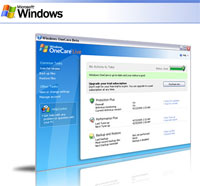 Microsoft has announced that it would begin testing OneCare Live – a PC-health care fix-it all application – with a general release sometime next year.
Microsoft has announced that it would begin testing OneCare Live – a PC-health care fix-it all application – with a general release sometime next year.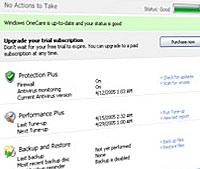 OneCare is a separately sold subscription-based service designed to work as a mainly “hands-off” application, quietly doing its good deeds in the background while sending security updates to users’ computer systems without them having to download or install the fixes.
OneCare is a separately sold subscription-based service designed to work as a mainly “hands-off” application, quietly doing its good deeds in the background while sending security updates to users’ computer systems without them having to download or install the fixes. The BBC has let rip with a new beta service that invites Web developers and designers outside of the organisation to start fiddling about with their content and “create cool new things”.
The BBC has let rip with a new beta service that invites Web developers and designers outside of the organisation to start fiddling about with their content and “create cool new things”. The UK broadcasting goliath made a commitment to support social innovation in response to last year’s Graf Report, and this is echoed in their plans to develop an open community where people can share expertise, ideas, and collaborative efforts.
The UK broadcasting goliath made a commitment to support social innovation in response to last year’s Graf Report, and this is echoed in their plans to develop an open community where people can share expertise, ideas, and collaborative efforts. It’s not all about profit though, with the BBC hoping that contributors will create prototypes on their Web sites to be freely shared with others for non-commercial use.
It’s not all about profit though, with the BBC hoping that contributors will create prototypes on their Web sites to be freely shared with others for non-commercial use. Microsoft ubermensch Bill Gates foresees mobile phones overtaking MP3s as the top choice among portable music players, while dismissing the popularity of Apple’s iPod player as unsustainable.
Microsoft ubermensch Bill Gates foresees mobile phones overtaking MP3s as the top choice among portable music players, while dismissing the popularity of Apple’s iPod player as unsustainable. “If you were to ask me which mobile device will take top place for listening to music, I’d bet on the mobile phone for sure,” Gates told the newspaper.
“If you were to ask me which mobile device will take top place for listening to music, I’d bet on the mobile phone for sure,” Gates told the newspaper. Xbox 360, Microsoft’s successor to their popular Xbox gaming console, will be “unleashed” tonight at a celebrity-packed launch broadcast on MTV, which shows at 8pm in the UK. It was launched on US MTV last night.
Xbox 360, Microsoft’s successor to their popular Xbox gaming console, will be “unleashed” tonight at a celebrity-packed launch broadcast on MTV, which shows at 8pm in the UK. It was launched on US MTV last night.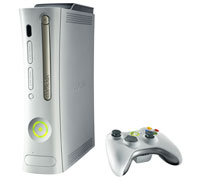 The Xbox will ship with a 12X dual-layer DVD-ROM drive – supporting progressive-scan DVD movies and a host of DVD and CD formats – three USB 2.0 ports, two memory unit slots and support for four wireless game controllers.
The Xbox will ship with a 12X dual-layer DVD-ROM drive – supporting progressive-scan DVD movies and a host of DVD and CD formats – three USB 2.0 ports, two memory unit slots and support for four wireless game controllers. “Xbox 360 marks the beginning of a renaissance in video games,” whooped Don Mattrick, president of Worldwide Studios for Electronic Arts. “The unbelievable Xbox 360 games in development at Electronic Arts will accelerate the industry’s mission to make video games the pre-eminent form of all entertainment.”
“Xbox 360 marks the beginning of a renaissance in video games,” whooped Don Mattrick, president of Worldwide Studios for Electronic Arts. “The unbelievable Xbox 360 games in development at Electronic Arts will accelerate the industry’s mission to make video games the pre-eminent form of all entertainment.”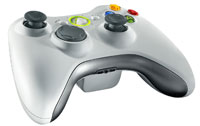 Naturally, gamers love to customise their experience, so there’s a camera option to let vain players add their mugshots into games or even see their friends onscreen as they frag them to an inch of their worthless lives.
Naturally, gamers love to customise their experience, so there’s a camera option to let vain players add their mugshots into games or even see their friends onscreen as they frag them to an inch of their worthless lives. Xbox 360 players can also access recorded TV and digital movies, music, video and photos stored on Windows XP Media Center Edition 2005-based PCs through any Xbox 360 system in the house.
Xbox 360 players can also access recorded TV and digital movies, music, video and photos stored on Windows XP Media Center Edition 2005-based PCs through any Xbox 360 system in the house.